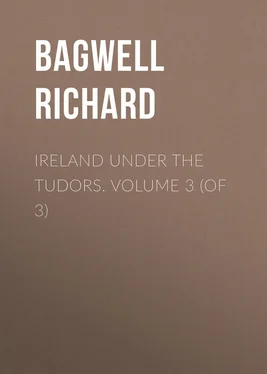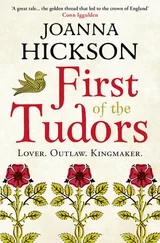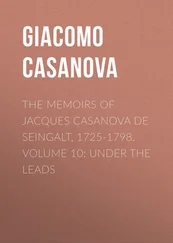Richard Bagwell - Ireland under the Tudors. Volume 3 (of 3)
Здесь есть возможность читать онлайн «Richard Bagwell - Ireland under the Tudors. Volume 3 (of 3)» — ознакомительный отрывок электронной книги совершенно бесплатно, а после прочтения отрывка купить полную версию. В некоторых случаях можно слушать аудио, скачать через торрент в формате fb2 и присутствует краткое содержание. Жанр: foreign_antique, foreign_prose, на английском языке. Описание произведения, (предисловие) а так же отзывы посетителей доступны на портале библиотеки ЛибКат.
- Название:Ireland under the Tudors. Volume 3 (of 3)
- Автор:
- Жанр:
- Год:неизвестен
- ISBN:нет данных
- Рейтинг книги:3 / 5. Голосов: 1
-
Избранное:Добавить в избранное
- Отзывы:
-
Ваша оценка:
- 60
- 1
- 2
- 3
- 4
- 5
Ireland under the Tudors. Volume 3 (of 3): краткое содержание, описание и аннотация
Предлагаем к чтению аннотацию, описание, краткое содержание или предисловие (зависит от того, что написал сам автор книги «Ireland under the Tudors. Volume 3 (of 3)»). Если вы не нашли необходимую информацию о книге — напишите в комментариях, мы постараемся отыскать её.
Ireland under the Tudors. Volume 3 (of 3) — читать онлайн ознакомительный отрывок
Ниже представлен текст книги, разбитый по страницам. Система сохранения места последней прочитанной страницы, позволяет с удобством читать онлайн бесплатно книгу «Ireland under the Tudors. Volume 3 (of 3)», без необходимости каждый раз заново искать на чём Вы остановились. Поставьте закладку, и сможете в любой момент перейти на страницу, на которой закончили чтение.
Интервал:
Закладка:
In the letter written by Sanders to Desmond in Fitzmaurice’s name, the Earl is reminded that the latter ‘warfareth under Christ’s banner, for the restoring of the Catholic faith in Ireland.’ Then, flying into the first person in his hurry, he says His Holiness ‘has made me general-captain of this Holy War.’ There are many allusions to Christ’s banner and to the ancient glories of the Geraldines, and the epistle ends with a recommendation to ‘your fellows, and to all my good cousins your children, and to my dear uncle your brother, longing to see all us, all one, first as in faith so in field, and afterwards in glory and life everlasting.’
A like appeal was made to the Earl of Kildare, and we may be sure that none of the Munster lords were forgotten. Friars were busy with O’Rourke, O’Donnell, and other northern chiefs, and the piratical O’Flaherties brought a flotilla of galleys, which might have their own way in the absence of men-of-war. Three of Fitzmaurice’s ships sailed away, and were expected soon to return with more help. Thomas Courtenay of Devonshire happened to be at Kinsale with an armed vessel, and was persuaded by his countryman Henry Davells, one of the Commissioners of Munster, to come round and seize the remaining Spanish ships. Courtenay seems not to have been in the Queen’s service; like so many other men of Devon, he was probably half-pirate and half-patriot. To cut out the undefended vessels from their anchorage was an easy and congenial task, and thus, to quote another Devonian, ‘James Fitzmaurice and his company lost a piece of the Pope’s blessing, for they were altogether destituted of any ship to ease and relieve themselves by the seas, what need soever should happen.’ The O’Flaherties sailed away with the two bishops on Courtenay’s arrival, but Maltby afterwards found their lair upon the shores of Clew Bay. One was promptly hanged by martial law; a second, who had property to confiscate, was reserved for the sessions, and a third was killed for resisting his captors; the rest were to be hanged when caught. Fitzmaurice had with him at Smerwick but twenty-five Spaniards, six Frenchmen, and six Englishmen, besides twenty-seven English prisoners whom he forced to work at the entrenchments. Provisions were scarce, and the whole enterprise might have collapsed had it not been for a crime which committed the Desmonds irretrievably. 19 19 Fitzmaurice to Desmond and Kildare, July 18, 1579; Waterhouse to Walsingham, July 24; notes of Mr. Herbert’s speech, Aug. 3; Maltby’s discourse April 8, 1580; Hooker in Holinshed .
On hearing of the landing in Kerry Drury had despatched a trusty messenger to confirm the Earl and his brother in their allegiance. The person selected was Henry Davells, a Devonshire gentleman who had served Henry VIII. in France, had afterwards seen fighting in Scotland, and had long lived in Carlow and Wexford, where he was well known and much respected. His countryman Hooker, who knew him, says he was not only the friend of every Englishman in Ireland, but also much esteemed by the Irish for his hospitality and true dealing. ‘If any of them had spoken the word, which was assuredly looked to be performed, they would say Davells hath said it, as who saith “it shall be performed.” For the nature of the Irishman is, that albeit he keepeth faith, for the most part, with nobody, yet will he have no man to break with him.’ The same writer assures us that the mere fact of being Davells’ man would secure any Englishman a free passage and hospitable reception throughout Munster and Leinster. He was equally valued by Desmond and Ormonde, an intimate friend of Sir Edmund Butler, and on such terms with Sir John of Desmond, whose gossip he was and whom he had several times redeemed out of prison, that the latter used to call him father. Davells now went straight to Kerry, saw the Earl and his brothers, whom he exhorted to stand firm, and visited Smerwick, which he found in no condition to withstand a resolute attack. Returning to the Desmonds he begged for a company of gallowglasses and sixty musketeers, with whom and with the aid of Captain Courtenay, he undertook to master the unfinished fort. Desmond refused, saying that his musketeers were more fitted to shoot at fowls than at a strong place, and that gallowglasses were good against gallowglasses, but no match for old soldiers. English officers afterwards reported that sixty resolute men might have taken Smerwick, and were thus confirmed in their belief that Desmond had intended rebellion from the first, and that Fitzmaurice, whose ability was undeniable, would not have taken up such a weak position without being sure of the Earl’s co-operation. But religious zeal might account for that.
Davells, who was accompanied by Arthur Carter, Provost Marshal of Munster, and a few men, started on his return journey, prepared no doubt to tell Drury that nothing was to be expected of the Desmonds. John of Desmond, accompanied by his brother James and a strong party, followed to Tralee, surrounded the tavern where the English officers lay, and bribed the porter to open the door. Davells and Carter were so unsuspicious that they had gone to bed, and allowed their servant to lodge in the town. When Davells saw Sir John entering his room with a drawn sword he called out, ‘What, son! what is the matter?’ ‘No more son, nor no more father,’ said the other, ‘but make thyself ready, for die thou shalt.’ A faithful page cast himself upon his master’s body; but he was thrust aside and Sir John himself despatched Davells.
Carter was also killed, and so were the servants. In a curious print the two Englishmen are represented as sleeping in the same bed. Sir John holds back the servant with his left hand and transfixes Davells with the right, while Sir James goes round, with a sword drawn, to Carter’s side. Outside stand several squads of the Desmond gallowglasses, and armed men are killing Davells’ followers, while Sanders appears in two places, carrying the consecrated papal banner, hounding on the murderers, and congratulating the brothers on their prowess. According to all the English accounts Sanders commended the murder as a sweet sacrifice in the sight of God, and two Irish Catholic historians mention it. But Fitzmaurice was a soldier, and disapproved of killing men in their beds. There is no positive evidence as to Desmond. Geraldine partisans say he abhorred the deed, but he never punished anyone for it, and Sir James was said to have pleaded that he was merely the Earl’s ‘executioner.’ Desmond accepted a silver-gilt basin and ewer, and a gold chain only a few days after the murder. 20 20 Hooker and Camden for the English view of Desmond’s conduct; Russell and O’Daly for the other side, and also O’Sullivan, ii. iv. 15. The picture is reproduced in the Irish (Kilkenny) Archæological Journal , 3rd S. i. 483. In his 27th chapter Mr. Froude quotes Mendoza to the effect that Davells was Desmond’s guest; but Hooker says distinctly that he ‘lodged in one Rice’s house, who kept a victualling-house and wine tavern.’ In a letter of Oct. 10, 1579, Desmond says his brother James was ‘enticed into the detestable act.’ E. Fenton to Walsingham, July 11, 1580; Lord Justice and Earl of Kildare to the Privy Council, Aug. 3, 1579. Examination of Friar James O’Hea in Carew , Aug. 17, 1580. Collection of matters to Nov. 1579.
‘Landed gentlemen,’ says Sidney Smith, ‘have molar teeth, and are destitute of the carnivorous and incisive jaws of political adventurers.’ The Munster proprietors held aloof with the Earl of Desmond, ‘letting “I dare not” wait upon “I would,”’ while the landless men followed his bolder and more unscrupulous brother. When Fitzmaurice disembarked, Desmond had 1,200 men with him; shortly after the murder of Davells he had less than 60; but Sir John was soon at the head of a large force. The activity of Maltby not only prevented any rising in Connaught, but also made it impossible for Scots to enter Munster. He lay at Limerick waiting till Drury was ready, and when the latter, who was ill, came to Limerick at the risk of his life, it was Maltby who entered the woods and drove the rebels from place to place. For a time Fitzmaurice and his cousin kept together, though it may be that the latter’s savagery was disagreeable to the man who had seen foreign courts, and who was evidently sincerely religious, though the English accused him of hypocrisy. According to Russell, who gives details which are wanting elsewhere, the two marched together unopposed into the county of Limerick, where one of Sir John’s men outraged a camp-follower. Fitzmaurice ordered him for execution, but Sir John, ‘little regarding the Pope’s commission, and not respecting murder or rape,’ refused to allow this, and Fitzmaurice, seeing that he could not maintain discipline, departed with a few horsemen and kernes, nominally on a pilgrimage to Holy Cross Abbey, really perhaps to enter Connaught through Tipperary and Limerick, and thus get into Maltby’s rear. In doing so he had to pass through the territory of a sept of Burkes, of whom some had been with him in his former enterprise. Fitzmaurice was in want of draught animals, and took two horses out of the plough. The poor peasants raised an alarm, and at a ford some miles south of Castle Connell the chief’s son Theobald, who was learned in the English language and law, and who may have had Protestant leanings, appeared with a strong party. He was already on the look-out, and had summoned MacBrien to his aid.
Читать дальшеИнтервал:
Закладка:
Похожие книги на «Ireland under the Tudors. Volume 3 (of 3)»
Представляем Вашему вниманию похожие книги на «Ireland under the Tudors. Volume 3 (of 3)» списком для выбора. Мы отобрали схожую по названию и смыслу литературу в надежде предоставить читателям больше вариантов отыскать новые, интересные, ещё непрочитанные произведения.
Обсуждение, отзывы о книге «Ireland under the Tudors. Volume 3 (of 3)» и просто собственные мнения читателей. Оставьте ваши комментарии, напишите, что Вы думаете о произведении, его смысле или главных героях. Укажите что конкретно понравилось, а что нет, и почему Вы так считаете.












